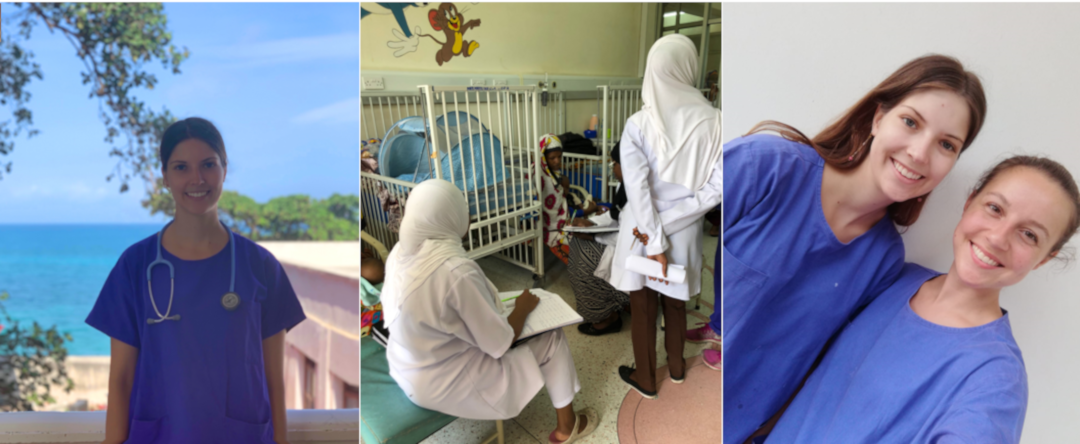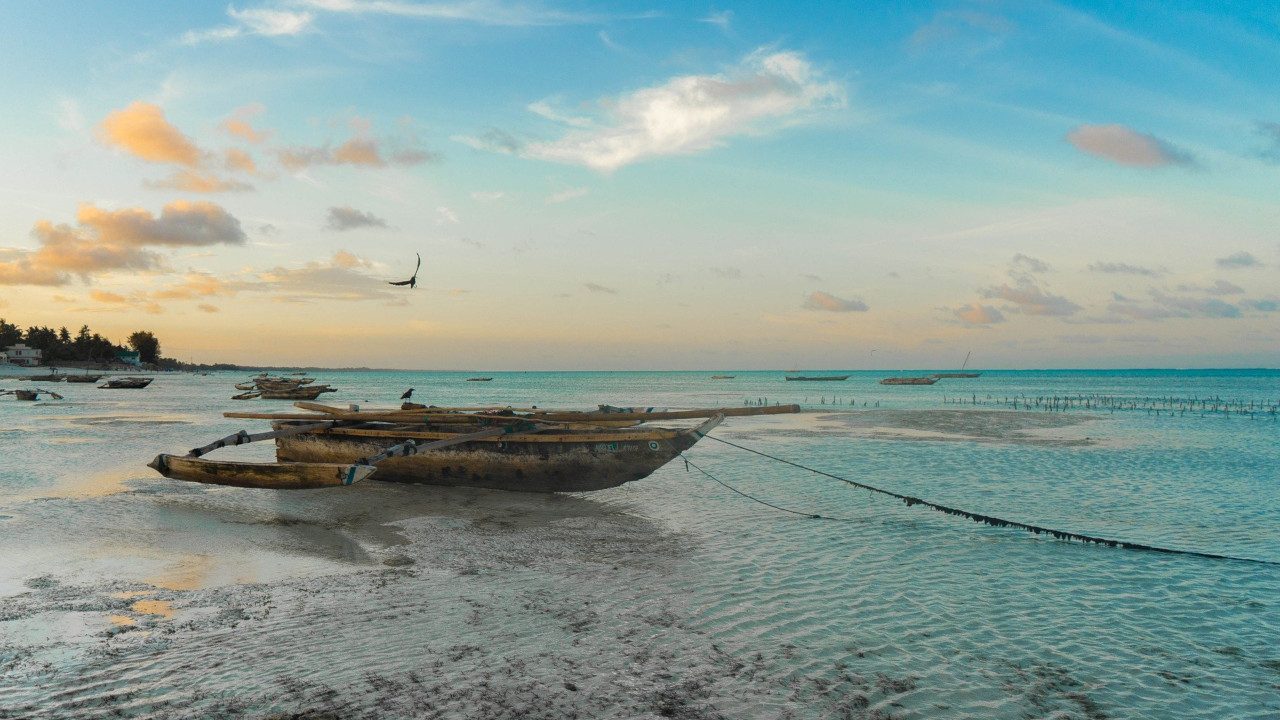Pia from Germany, Medical Student:
I completed part of my mandatory elective at the Mnazi Mmoja Hospital in Zanzibar, Tanzania. I went to Zanzibar together with a lovely colleague of mine whom I met in med school. I worked in the hospital for fifteen days and completed the remaining one and a half months of my elective in German hospitals. At German medical universities, we have to complete electives in medical outpatient facilities, which I chose to completed in Germany as well. At the Mnazi Mmoja Hospital in Zanzibar I spent most of my elective at the pediatric ward but I also got to observe the work in the maternity ward every now and then.
During which semester did you do your medical elective abroad?
I did my medical elective during the term break of my 6th semester.
Please describe why you decided to do a medical internship / elective abroad.
I decided to do part of my mandatory elective abroad for many reasons: On the one hand, my friends in med school who had already done a medical elective abroad totally recommended this experience to me not only to develop my skills from a medical but also from a personal point of view. Some of these friends had completed their elective in Zanzibar and were absolutely thrilled about the experience. I’ve always wanted to get to know the medical system in another country and Africa was particularly interesting for me. I wanted to learn about the different health systems worldwide and be able to draw a comparison between Germany and a (developing) country. Another aspect that encouraged me to do my elective abroad was that I wanted to learn to be more independent and to improve my medical communication skills in English. And last but not least I was hoping to meet new people and to make international friends.
How did you come across World Unite!?
I found World Unite! on the internet. Their informative website spoke to me and after I had sent my inquiry, I quickly got a response from a team member who answered all my questions. I liked the fact that I could reach my World Unite! contact on WhatsApp and never had to wait long for a reply. Two friends of mine had completed their electives in Zanzibar through World Unite! before and I knew the organization was trustful and that everything had worked out well for them. Furthermore, I did not find many agencies offering electives in Zanzibar and I definitely wanted to go there, so the decision was easy to make!
Which departments of the hospital did you work in? Did you stay in one department the whole time or rotate through multiple departments and why?
I chose not to rotate through different departments and spent my entire elective in the pediatric department. However, the hospital staff encouraged me to visit the maternity ward and the delivery room from time to time to get even more exposure. I’ve also heard of other medical and nursing students or who rotated through various departments during their stay. However, in my opinion this does only make sense for a longer stay. For me, the best way to spend my 15 elective days was to stay in one department. The pediatric ward at Mnazi Moja Hospital has two floors which means that you can still somehow rotate from floor to floor internally. For example, the children in the monitoring room and premature babies were downstairs. The children with malnutrition and diarrhea were on the 2nd floor. I was able to see and experience a broad range of diseases and illnesses. Every day, there was an open consultation hour for children with acute diseases where a different specialist was present every day. Overall, I can really recommend pediatrics for an elective abroad!
Describe a typical day at the hospital, including your work days, working hours and your tasks.
Working in Zanzibar is more relaxed than in European countries. The doctors are very flexible about the working hours and won’t tell you how much time you need to spend at the hospital. It’s not a problem if you would like to leave earlier on some days, but it’s also totally possible to stay for the entire day, to observe the routines of the health care staff and also to carry out some tasks independently.
The day starts in the morning with an early meeting with the pediatricians. I was welcome to join the meeting and to actively involve. After the meeting, they would go back to the ward and start their morning patient visits. I usually accompanied the doctors to all rooms where they would take a close look at each child and do examinations, if needed. Blood sampling and venous catheters are usually done by the nurses. The doctors then make a diagnosis and suggest how to continue the therapy. The doctors usually take a lot of time for each child and the parents. I was lucky to have a great supervising doctor who was always happy to answer and translate all questions. Most patients only understand Swahili and no English, which made it difficult for me to get a detailed medical history from them on my own. Med schools in Tanzania teach in English and local students therefore speak very good English.
Mostly, the morning visits ended between eleven and twelve and depending on how you felt, you could either spend the rest of the day at the beach or stay at the hospital a little longer and see if you were needed for more tasks. I have rarely stayed longer than noon, since there are fewer medical activities in the afternoon.
What did you learn during your elective abroad?
I learned a lot from my medical elective. It was less of technical knowledge for my studies, but a lot of knowledge for my future life that I gained. As I had hoped, I made many new friends and also improved my English skills a lot. Honestly, I was quite proud of myself being able to manage my elective and everything related to it on my own and in a foreign country. African culture and life in an African country have made me appreciate a lot of things here in Germany, for instance not to take seemingly normal things for granted.
Which cultural differences did you observe between the medical systems / treatments / doctor-patient relationships etc. in your host country and your home country?
It was very exciting to see other diseases compared to Germany. For example, there were several children with sickle cell anemia in the pediatric ward, a disease which we rarely have in Germany. Another common disease for children in Zanzibar is malnutrition, whereas in Germany we struggle with obesity and high blood pressure. I also learned how different our medical resources, diagnostic and therapeutic options in Germany are compared to Zanzibar. If you break your leg in Germany you might be able to play soccer and do sports only a few weeks after. Locals in Africa say that they don’t dare to play football because if they break their leg they may never be able to walk again. On the one hand because the standard in the local hospitals is very different and on the other hand many cannot afford the therapy.
How did you spend your free time in Zanzibar?
There are endless opportunities for leisure activities only in Stone Town/Zanzibar Town. Locals will be happy to give you recommendations, so I’d like to encourage you to speak to people and to mingle with the local community. Always remember to bargain if you want to shop on local markets. If you want to travel on the island, my recommendation is not to book the standard tours for tourists. Zanzibar Town has a Dala Dala (public mini bus) connection to almost everywhere on the island. From here you can do a spice tour, visit the Jozani Forest or take a boat to Prison Island. I highly recommend the night market and the numerous bars in Stone Town where you can even sing Karaoke. Once per week, World Unite! arranged a joint event for all volunteers and interns from their different projects, e.g. a meet-up for coffee in the afternoon or a pizza dinner. It’s not mandatory to join, but great fun! I highly recommend you to plan in some extra time after your placement and to travel the island. I would totally do my elective on Zanzibar again at any time and recommend it to anyone!
Pia completed her elective abroad with World Unite!, a specialist provider for electives, internships and volunteering in medicine, nursing, therapies and midwifery. Click here to read more about their hospital options in Moshi, Tanzania and learn how to apply for your own elective abroad!


